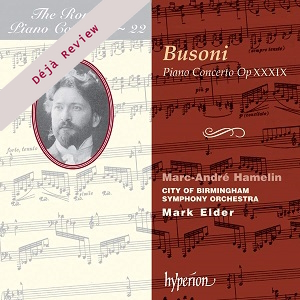
Déjà Review: this review was first published in October 2002 and the recording is still available.
Ferruccio Busoni (1866-1924)
Piano Concerto in C, Op 39
Marc-André Hamelin (piano)
City of Birmingham Symphony Chorus & Orchestra / Mark Elder
rec. 1999, Symphony Hall, Birmingham, UK
The Romantic Piano Concerto: Volume 22
Hyperion CDA67143 [74]
I remember once hearing a performance of this concerto, in Cape Town in the early 1970s and being struck by the sheer magnitude of the work, its Mahlerian length, its Lisztian (Faust Symphony) choral finale with men’s voices, and the ferocious difficulty of the solo part which reflects its composer’s pianistic virtuosity. It was almost as much a feat of endurance for the audience to listen to the work as it was for the soloist to play it. Endurance was the name of the game. Thirty years later it remains a revelatory experience to hear it again, in the more than capable hands of Marc-André Hamelin, who clearly has the measure of its technical demands, expertly accompanied by Mark Elder and the CBSO choral and orchestral forces. It was John Ogdon, in turn inspired by Ronald Stevenson, who kept it alive after the immediate successors to Busoni had passed on (among them Mark Hambourg and Egon Petri, this latter giving the British premiere in 1909).
There are five movements each bearing a title, some of them deceptively innocuous such as ‘Happy piece’ or ‘Sad piece’, but it is more complex than that with the alternate first, middle and last movements represented by Graeco-Roman, Egyptian and Babylonian architecture respectively. The solo/orchestral relationship is quite different from what one expects, much more equally defined and balanced with the piano sometimes reversing role and accompanying the orchestra. It is a work which almost seems to underscore the exhausted panoply of Romantic harmony; it is time to move on after this culmination of the Romantic concerto and it is indeed the summation of his youth and he goes on to another musical language in his next works. The text for the fifth movement, in which musical material heard during the preceding hour is quoted, is a mystic hymn (sung in German by an invisible male chorus) from a poem entitled Aladdin by the Dane Adam Oehlenschläger (1779-1850), ‘Lift up your hearts to the Eternal Almighty, draw ye nigh to Allah’.
This is a landmark disc of an epic, landmark concerto, one of the finest in the Hyperion series.
Christopher Fifield
Help us financially by purchasing from




















